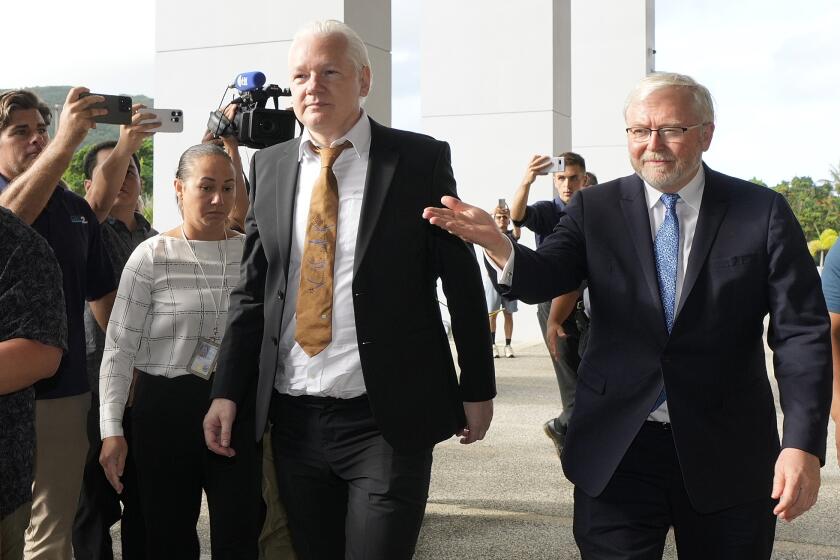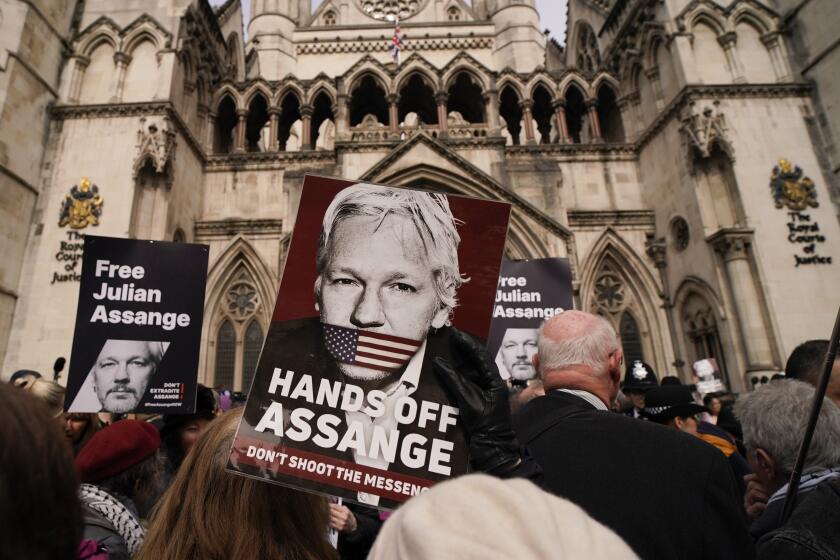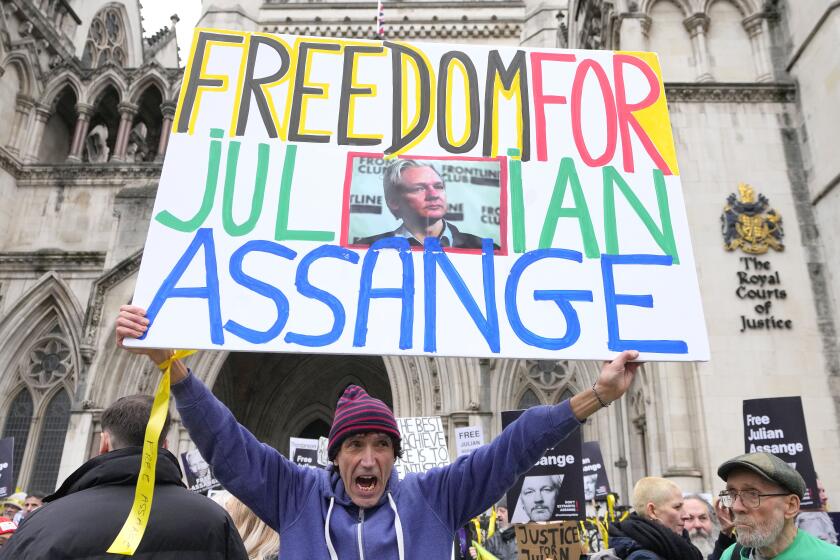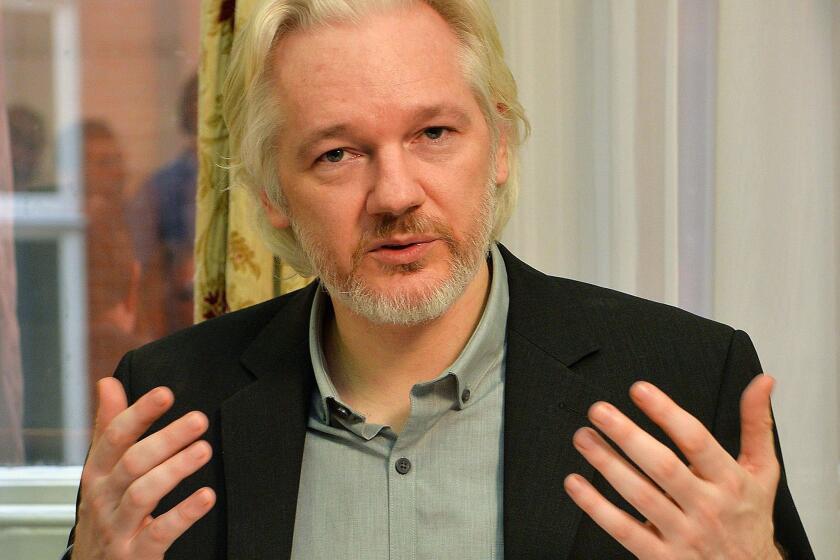WikiLeaks founder Julian Assange returns to Australia a free man
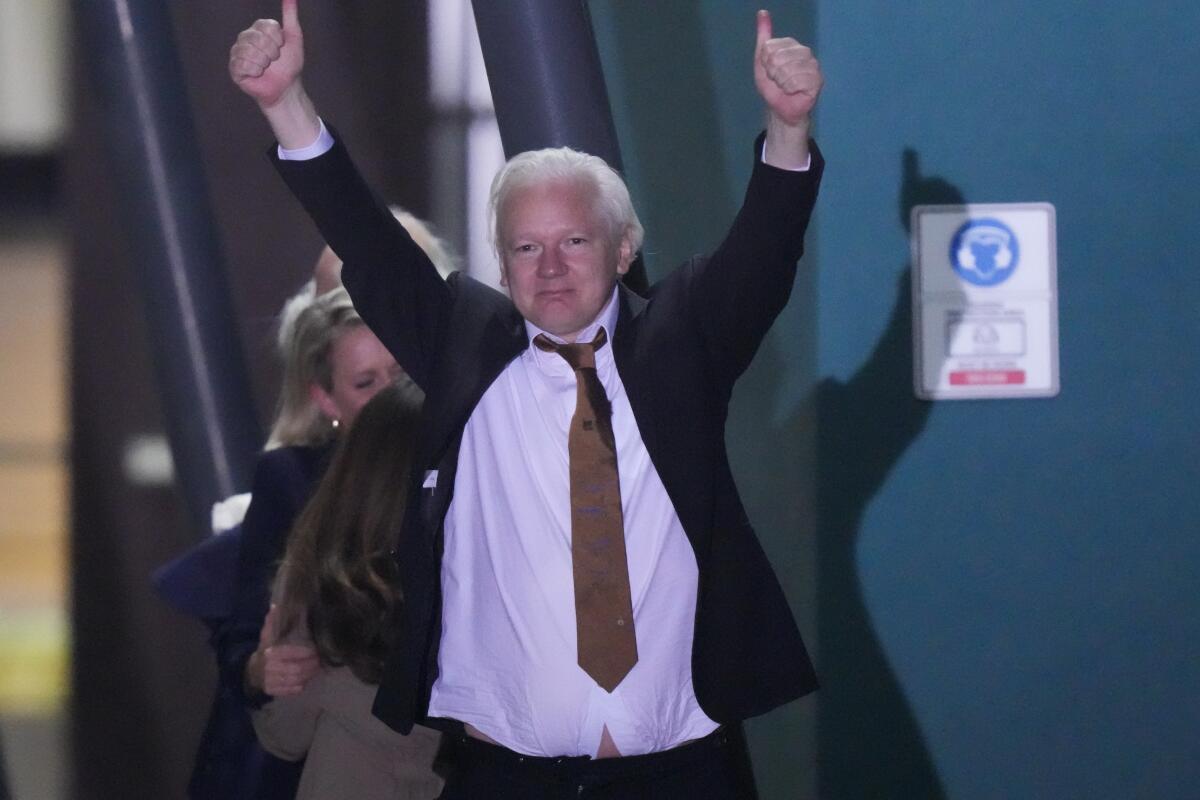
- Share via
CANBERRA, Australia — WikiLeaks founder Julian Assange returned to his homeland, Australia, aboard a charter jet and raised a celebratory clenched fist as his supporters cheered Wednesday, hours after pleading guilty to obtaining and publishing U.S. military secrets in a deal with Justice Department prosecutors that concludes a drawn-out legal saga.
Assange told Prime Minister Anthony Albanese in a phone call from the capital Canberra’s airport tarmac that Australian government intervention in the U.S. prosecution had saved his life, Assange lawyer Jennifer Robinson said.
Assange embraced wife Stella and father John Shipton, who were waiting on the tarmac, but avoided media at a news conference less than two hours after he landed.
“Julian wanted me to sincerely thank everyone. He wanted to be here. But you have to understand what he’s been through. He needs time. He needs to recuperate and this is a process,” Stella Assange told reporters.
Assange was accused of receiving and publishing hundreds of thousands of war logs and diplomatic cables that included details of U.S. military wrongdoing in Iraq and Afghanistan. His activities drew an outpouring of support from press freedom advocates, who heralded his role in bringing to light military conduct that might otherwise have been concealed from view and warned of a chilling effect on journalists. Among the files published by WikiLeaks was a video of a 2007 Apache helicopter attack by American forces in Baghdad that killed 11 people, including two Reuters journalists.
WikiLeaks founder Julian Assange pleaded guilty to a single felony charge for publishing U.S. military secrets in a deal that secures his freedom.
The case came to a surprise end in a most unusual setting with Assange, 52, entering his plea in a U.S. district court in Saipan, the capital of the Northern Mariana Islands. The American commonwealth in the Pacific is relatively close to Assange’s native Australia and accommodated his desire to avoid entering the continental United States.
Albanese said Assange told him during their phone call that he was looking forward to playing with his sons, conceived while the father was in self-exile in the Ecuadorean Embassy in London for seven years.
“He described it as a surreal and happy moment, his landing here in our national capital, Canberra,” Albanese told reporters in Parliament House. “I had a very warm discussion with him this evening. He was very generous in his praise of the Australian government’s efforts.”
Robinson said she became “very emotional” when she overheard Assange’s conversation with the prime minister.
“Julian thanked him and the team and told the prime minister that he had saved his life. And I don’t think that that’s an exaggeration,” Robinson said.
Assange’s British court hearings in which he fought extradition to the United States had heard evidence of his failing health and potential risk for self-harm in the U.S. penal system.
He was accompanied on the flights by Australian Ambassador to the U.S. Kevin Rudd and High Commissioner to the United Kingdom Stephen Smith, both of whom played key roles in negotiating his freedom with London and Washington.
The flights were paid for by the “Assange team,” Deputy Prime Minister Richard Marles said, adding his government played a role in facilitating the transport.
The court says Julian Assange can’t be extradited to the U.S. on espionage charges unless U.S. authorities guarantee he won’t get the death penalty.
Albanese told Parliament that Assange’s freedom, after he spent five years in a British prison fighting extradition to the United States, was the result of his government’s “careful, patient and determined work.”
It is unclear where Assange will go from Canberra and what his future plans are. His South African-born lawyer wife and mother of his two children has been in Australia for days awaiting his release.
Another of Assange’s lawyers, Barry Pollack, expected his client would continue vocal campaigning.
Shipton said ahead of his son’s arrival that he hoped that his firstborn child was coming home to the “great beauty of ordinary life.”
“He will be able to spend quality time with his wife, Stella, and his two children, be able to walk up and down the beach and feel the sand through his toes in winter, that lovely chill,” Shipton said.
The plea deal required Assange to admit guilt to a single felony count but also permitted him to return to Australia without any time in an American prison.
The judge sentenced him to the five years he’d already spent behind bars in the U.K. fighting extradition to the U.S. on an Espionage Act indictment that could have carried a lengthy prison sentence in the event of a conviction. Assange was holed up for seven years before that in the Ecuadoran Embassy in London.
The conclusion enables both sides to claim a degree of satisfaction.
Julian Assange’s lawyers have begun their final U.K. legal challenge to stop the WikiLeaks founder from being sent to the United States for trial.
The Justice Department, facing a defendant who had already served substantial jail time, was able to resolve — without trial — a case that raised thorny legal issues and that might never have reached a jury at all given the plodding pace of the extradition process. Assange, for his part, signaled a begrudging contentment with the resolution, saying in court that though he believed the Espionage Act contradicted the 1st Amendment, he accepted the consequences of soliciting classified information from sources for publication.
The plea deal, disclosed Monday night in a sparsely detailed Justice Department letter, represents the latest — and presumably final — chapter in a court fight involving the eccentric Australian computer expert who has been celebrated by supporters as a transparency crusader but lambasted by national security hawks who insist that his conduct put lives at risks and strayed far beyond the bounds of traditional journalism duties.
Prosecutors alleged that Assange teamed with former Army intelligence analyst Chelsea Manning to obtain the records, including by conspiring to crack a Defense Department computer password, and published them without regard to American national security. Names of human sources who provided information to U.S. forces in Iraq and Afghanistan were among the details exposed, prosecutors have said.
The indictment was unsealed in 2019, but Assange’s legal woes long predated the criminal case and continued well past it.
Weeks after the release of the largest document cache in 2010, a Swedish prosecutor issued an arrest warrant for Assange based on one woman’s allegation of rape and another’s allegation of molestation. Assange has long maintained his innocence, and the investigation was later dropped.
He presented himself in 2012 to the Ecuadoran Embassy in London, where he claimed asylum on the grounds of political persecution, and spent the following seven years in self-exile there, welcoming a parade of celebrity visitors and making periodic appearances from the building’s balcony to address supporters.
A British judge has denied bail for WikiLeaks founder Julian Assange, who has been jailed since 2019 as he fights extradition to the United States.
In 2019, his hosts revoked his asylum, allowing British police to arrest him. He remained locked up for the last five years while the Justice Department sought to extradite him, in a process that encountered skepticism from British judges who worried about how Assange would be treated by the United States.
Ultimately, though, the resolution sparing Assange prison time in the U.S. contradicts years of ominous warnings by Assange and his supporters that the American criminal justice system would expose him to unduly harsh treatment, including potentially the death penalty — something prosecutors never sought.
Last month, Assange won the right to appeal an extradition order after his lawyers argued that the U.S. government provided “blatantly inadequate” assurances that he would have the same free speech protections as an American citizen if extradited from Britain.
His wife, Stella Assange, told the BBC from Australia that it had been “touch and go” over 72 hours whether the deal would go ahead, but she felt “elated” at the news.
Assange on Monday had left the London prison where he has spent the last five years after being granted bail during a secret hearing last week.
Rycroft and McGuirk write for the Associated Press. Rycroft reported from Canberra and McGuirk from Melbourne. AP writers Mari Yamaguchi and Kimberly Esmores in Saipan, Northern Mariana Islands; Alanna Durkin Richer in Washington; Eric Tucker in Port Pierce, Fla.; Napat Kongsawad and David Rising in Bangkok and Jill Lawless and Brian Melley in London contributed to this report.
More to Read
Sign up for Essential California
The most important California stories and recommendations in your inbox every morning.
You may occasionally receive promotional content from the Los Angeles Times.
